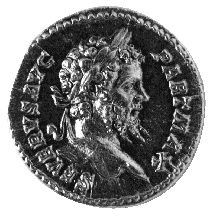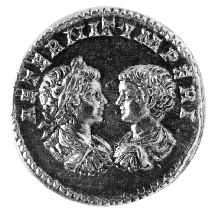



(110) Septimius Severus - AV aureus, A.D. 200-201, 7.40 g. (inv.
91.194).
Obverse: Laureate bust of Septimius Severus r.; SEVERVS AVG(VSTVS) PART(HICVS)
MAX(IMVS): Severus Augustus, greatest conqueror of the Parthians.
Reverse: Confronted draped and cuirassed busts of Antoninus l., laureate,
and Geta r.; AETERNIT(ATI) IMPERI(I): to the eternity of the empire.
Provenance: Bank Leu, 1986.
Bibliography: H. Mattingly and E.A. Sydenham, The Roman Imperial Coinage
IV.1: Pertinax to Geta (London 1936) 155.
Lucius Septimius Severus was born in Leptis Magna in North Africa and emerged
as sole emperor in the chaotic period after the murder of the emperor Pertinax,
when several rivals for the throne engaged in civil war from A.D. 193 to
197. Early in his reign, Severus annexed Mesopotamia and celebrated important
victories over the Parthians, for which he received the title Parthicus
Maximus (see no. 111).
His victory over his rivals and his position on the throne assured, Severus
concentrated upon building a dynasty on the Antonine model. He had himself
declared the adopted son of Marcus Aurelius in A.D. 196, changing the name
of his elder son, Bassianus, to Marcus Aurelius Antoninus (he would later
become known as Caracalla). The coins of the period depict members of the
imperial family and announce plans for the succession, which it is hoped
will result in the aeternitas imperii, the eternity of the empire.
Severus' portrait on his earliest coins depicts him either in the types
of the other contenders to the throne, probably because his official portrait
type had not yet been established, or as a military officer with a furrowed
brow and short beard. The type that follows his adoption into the Antonine
family, however, takes on a family resemblance to the Antonines, particularly
similarity to portraits of Marcus Aurelius, with curly hair and a longer
beard. On the reverse are the emperor's two sons; the elder, Antoninus,
on the left had been elevated to the rank of Augustus in A.D. 198 and is
therefore distinguished by his laurel wreath from his brother, Geta, whose
rank was Caesar. Geta would not be elevated to Augustus until A.D. 209,
and his delayed promotion no doubt contributed to the bitter enmity between
the two brothers that led Antoninus to murder Geta shortly after the death
of Severus.
R.E.B.



All contents copyright (c) 1996.
Lawrence University
All rights reserved.